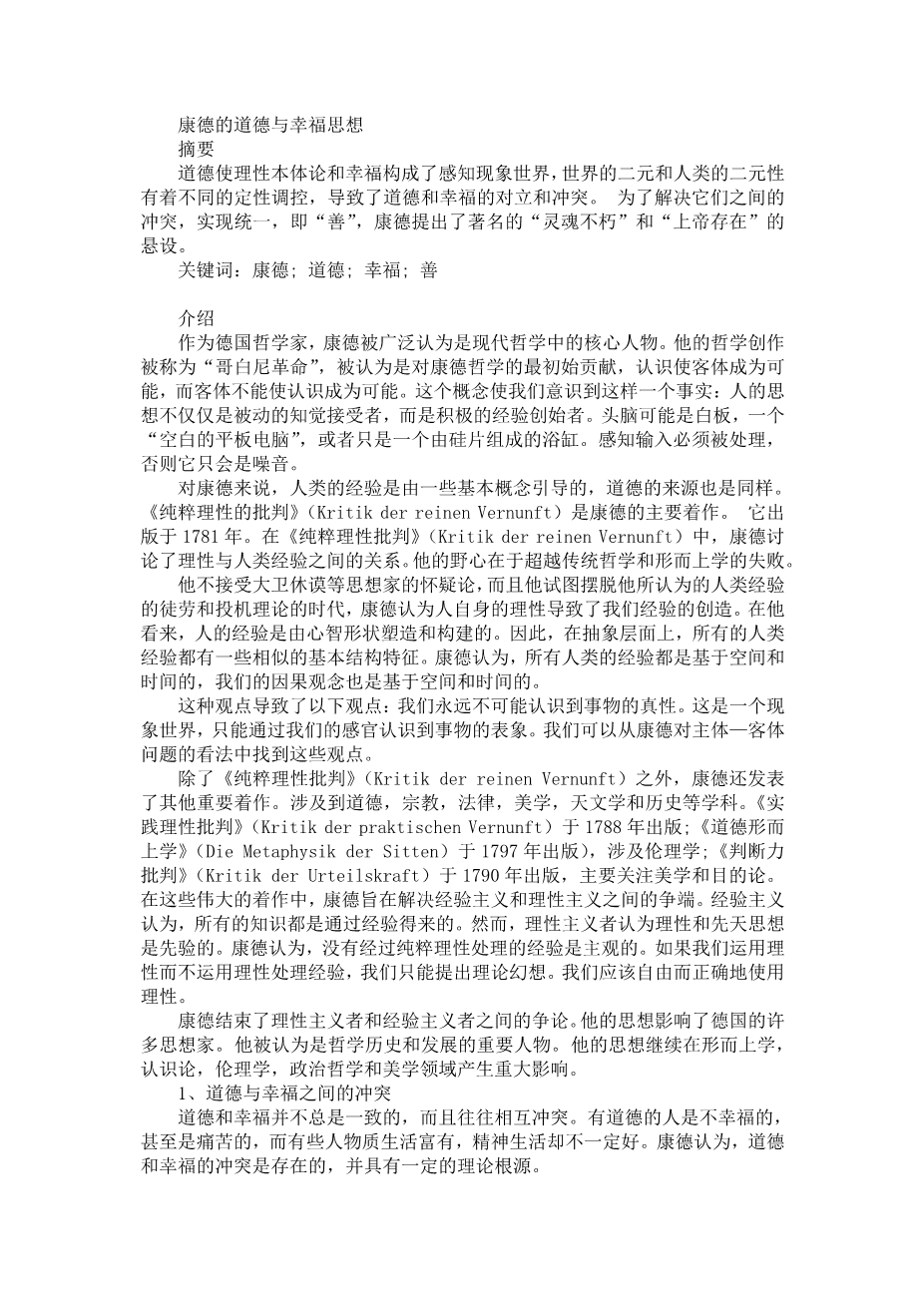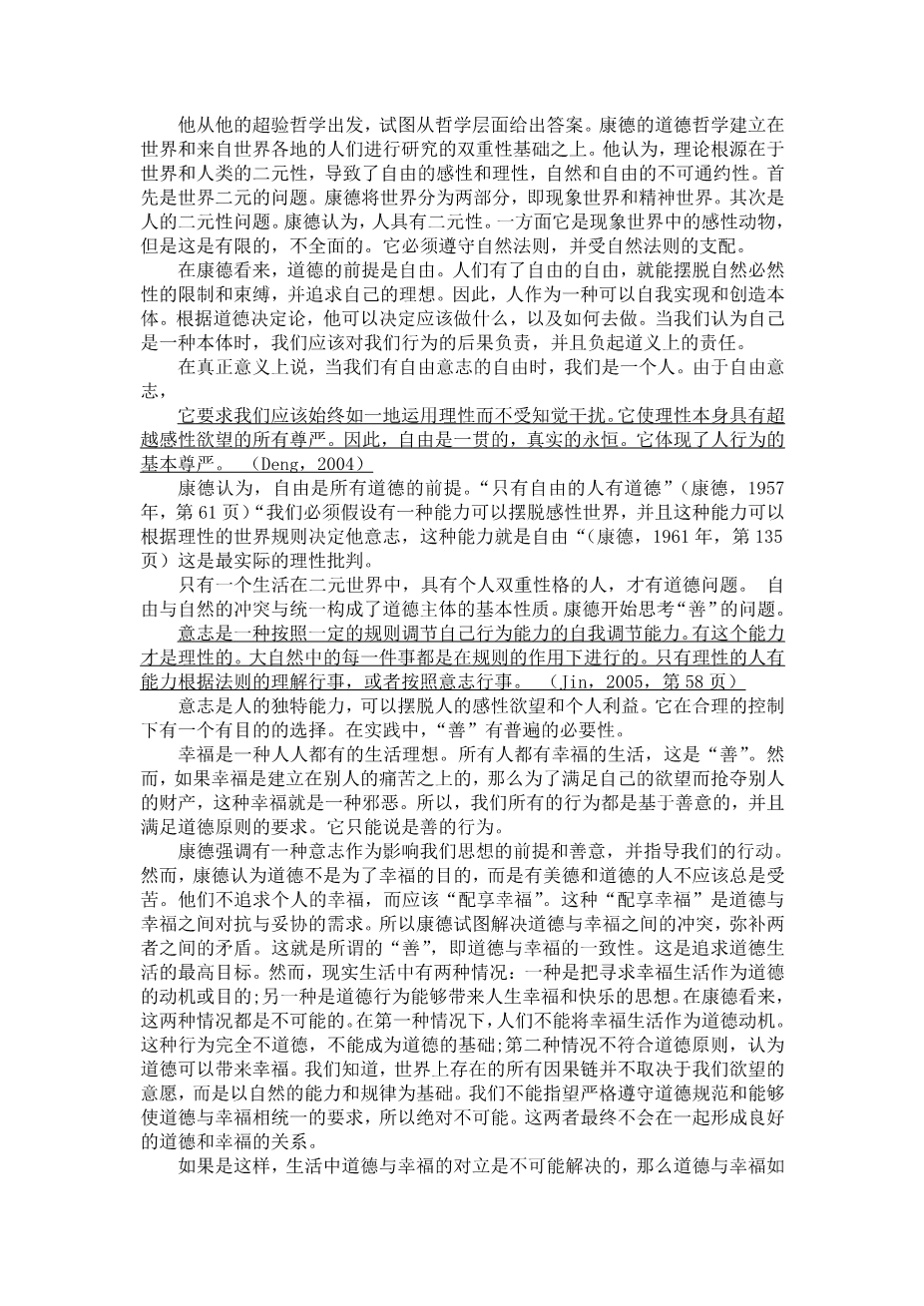Studies in Sociology of Science
Vol. 5, No. 4, 2014, pp. 64-67
DOI: 10.3968/5704
ISSN 1923-0176 [Print]
ISSN 1923-0184 [Online]
www.cscanada.net www.cscanada.org
Kant’s Thoughts on Morality and Happiness
YANG Niansi[a],*
[a]Institute of Politics and Public Administration, Southwest University, Chongqing, China.
*Corresponding author.
Received 5 August 2014; accepted 28 September 2014
Published online 26 November 2014
Abstract
Morality makes the rational ontology and happiness make the perceptual phenomenon world, both of which have different qualitative regulation due to the binary world and human’s duality, which leads to the opposition and conflict. In order to solve the conflict between them, realizing reunification, namely “good”, Kant puts forward the famous “immortal soul” and “God exists” suspension set.
Key words: Kant; Morality; Happiness; Good
Yang, N. S. (2014). Kant’s Thoughts on Morality and Happiness. Studies in Sociology of Science, 5 (4), 64-67. Available from: URL: http://www.cscanada.net/index.php/sss/article/view/5704 DOI: http://dx.doi.org/10.3968/5704
To Kant, human experience is guided by some basic concepts, and that reason is the source of morality. Critique of Pure Reason (Kritik der reinen Vernunft), is Kant’s major work. It was published in 1781. In Critique of Pure Reason (Kritik der reinen Vernunft), Kant discussed the relationship between reason and human experience. His ambition was to move beyond what he took to be failures of traditional philosophy and metaphysics.
He didn’t accept the skepticism of thinkers such as David Hume, and he tried to get rid of what he considered an era of futile and speculative theories of human experience, Kant argues that the necessary features of our minds lead to the creation of our experiences. In his view, human’s experience are shaped and structured by the mind shapes. As a result, on an abstract level, all human experience has some similar basic structural characteristics. Kant argues that all human experience is based on space and time, and our concepts of cause and effect are also based on space and time.
This view leads to the following consequence: We can never have direct experience of things. It is a phenomenal world that is only conveyed by our senses. Kant’s views
upon the subject–object problem is where we can find
INTRODUCTION
As a German philosopher, Immanuel Kant is widely considered to be a central figure in modern philosophy. His philosophical creation is called “Copernican Revolution, which is considered as the most original contribution to philosophy To Kant, the representation makes the object possible while the object can’t makes the representation possible. This concept made us become aware of the fact that the human mind is not just a passive recipient of perception but an active originator of experience. The mind could be a tabula rasa, a “blank tablet,” or just a bathtub, which is composed of silicon chips. Perceptual input must be processed, or it would just be noise.
these claims.
Besides Critique of Pure Reason (Kritik der reinen Vernunft), Kant published other important works. They all discuss the subjects on ethics, religion, law, aesthetics, astronomy, and history. The Critique of Practical Reason (Kritik der praktischen Vernunft) was published in 1788; The Metaphysics of Morals (Die Metaphysik der Sitten) was published in 1797), which dealt with ethics; The Critique of Judgment (Kritik der Urteilskraft ) was published in 1790, which focuses on aesthetics and teleology. In these great works, Kant aimed to resolve disputes between empirical and rationalist approaches. According to empiricism, all knowledge comes through experience. However, the
rationalists argue that reason and innate ideas were prior. Kant claimed that experience is purely subjective without first being processed by pure reason. If we use reason and don’t apply the reason to experience, we can only come up with theoretical illusions. We should use reason freely and properly.
Kant ended the debate between the rationalists and empiricists. And his ideas influenced many thinkers in Germany during his lifetime. He is considered as a major figure in the history and development of philosophy. His thought continues to have a major influence in the fields of metaphysics, epistemology, ethics, political philosophy, and aesthetics.
THE CONFLICT BETWEEN MOARLITY AND HAPPINESS
Morality and happiness are not always consistent, and often conflict between them. The man with morality is not happy, even painful while some are rich in material life and spiritual life are but not necessarily good. According to Kant, conflict exists, and has a certain theoretical roots.
He sets off from his transcendental philosophy, trying to give answer from the philosophy level. Kant’s moral philosophy is based on the duality of the world and people from all over the world to conduct research. He believes, the theoretical root lies in the duality of the world and people all over the world, leading to the perceptual and the rational, nature and the incommensurability of freedom. The first is the issue of binary world. Kant divides the world into two, namely the phenomenon of the world and the self of the world. The second is the duality problem. According to Kant, the person has the duality, on the one hand. It is emotional animal in the world of phenomenon. It is limited and not fu
剩余内容已隐藏,支付完成后下载完整资料


英语译文共 4 页,剩余内容已隐藏,支付完成后下载完整资料
资料编号:[478815],资料为PDF文档或Word文档,PDF文档可免费转换为Word
以上是毕业论文外文翻译,课题毕业论文、任务书、文献综述、开题报告、程序设计、图纸设计等资料可联系客服协助查找。


